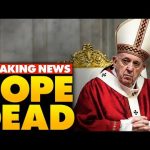The world awoke to somber news from Rome as Pope Francis, the 266th leader of the Roman Catholic Church, passed away on Easter Monday at the age of 88. His death, officially attributed to a cerebral stroke and subsequent heart failure, came after a period of declining health marked by recent bouts of pneumonia and other chronic illnesses. The pontiff died peacefully in his residence at Casa Santa Marta at 7:35 AM, just a day after making a final public appearance to greet the faithful gathered in St. Peter’s Square for Easter celebrations.
Pope Francis’s health had been a subject of concern for months. Earlier this year, he endured a five-week hospitalization for double pneumonia, compounded by underlying conditions such as type 2 diabetes and hypertension. Despite these challenges, Francis remained active in his ministry, maintaining a busy schedule and continuing to address global issues until his final hours. His resilience in the face of adversity was emblematic of his papacy, but it also raises questions about the Vatican’s transparency and preparedness during times of papal infirmity.
Throughout his 12-year tenure, Pope Francis became known for a pastoral approach that often clashed with traditional Catholic doctrine. He prioritized social justice issues—championing migrants, climate change, and outreach to marginalized groups—while sometimes appearing to sideline longstanding Church teachings on matters like marriage and sexuality. While these stances won him praise from progressive circles and the secular media, they also sowed division within the Church, leaving many faithful Catholics concerned about the erosion of doctrinal clarity and the dilution of timeless truths.
As the Vatican prepares for Francis’s funeral and the subsequent conclave, it’s worth reflecting on the broader implications of his legacy. His papacy was marked by a relentless push for reform and inclusivity, but often at the expense of tradition and orthodoxy. The Church now stands at a crossroads: will it continue down the path of progressive activism, or will it return to the spiritual and moral foundations that have defined it for centuries? This is a pivotal moment, not just for Catholics, but for all who look to the Vatican for moral leadership in a world beset by confusion and conflict.
The crowds in St. Peter’s Square, united in mourning, are a testament to the enduring power of faith and the universal longing for truth. As the Church prepares to lay Pope Francis to rest, many are praying not only for his soul, but for a new era of clarity, courage, and fidelity to the teachings that have sustained Christianity for millennia. The next pope will inherit not just the keys to the Vatican, but the responsibility to heal divisions and restore confidence in the Church’s eternal mission.




